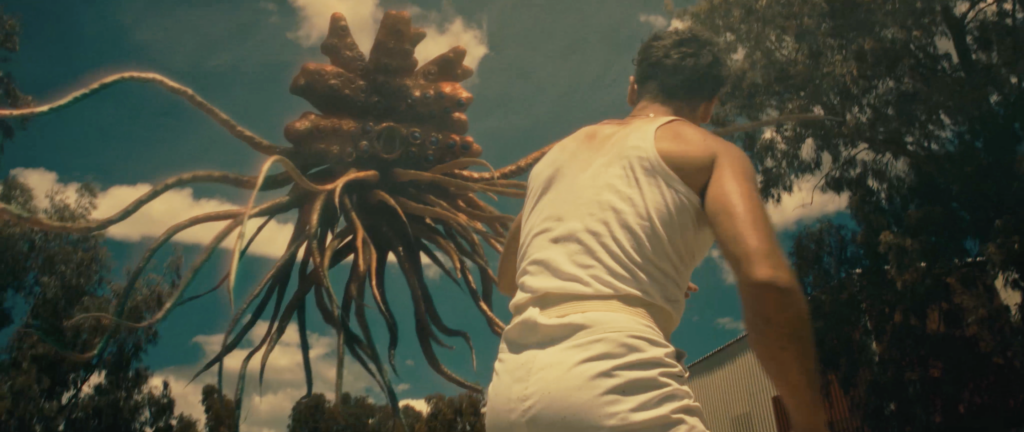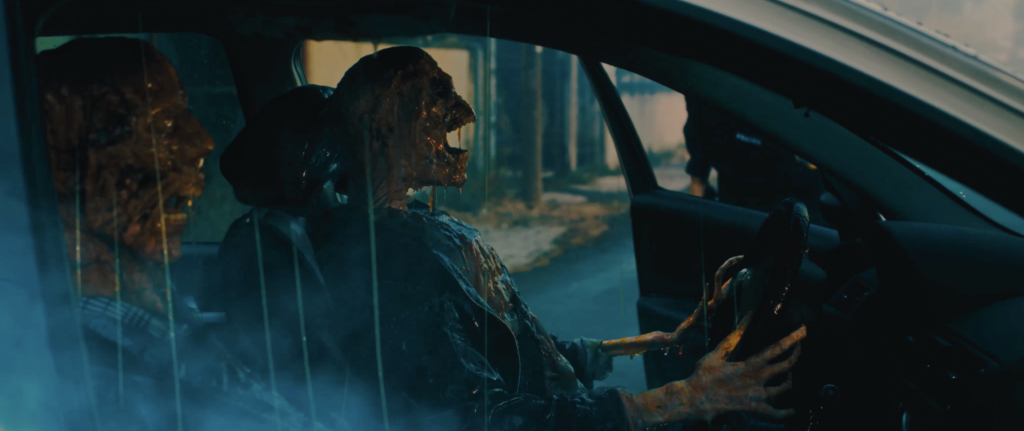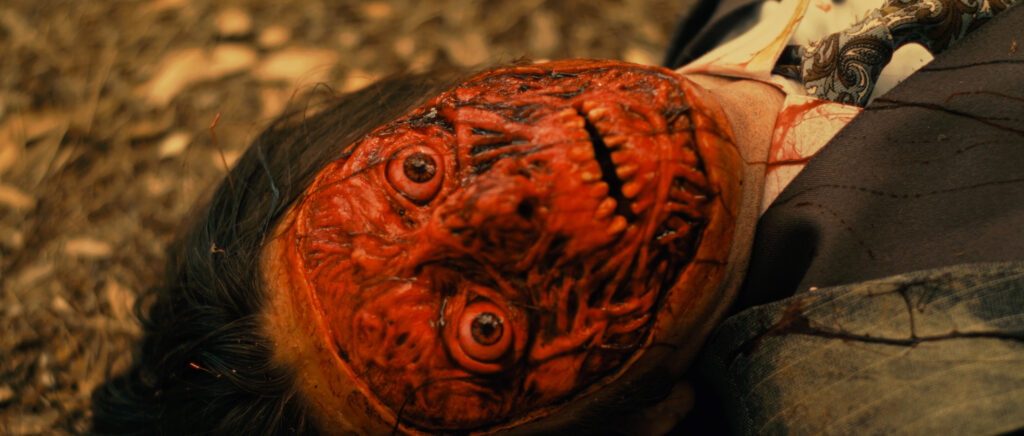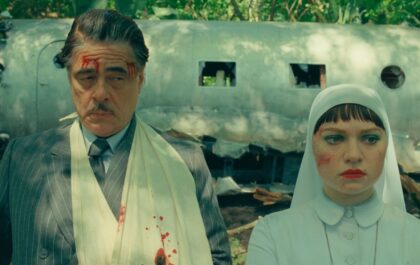Liefhebbers van moderne cultcinema of hoe je het ook mag noemen zullen de namen van Konstantinos Koutsoliotas en Elizabeth E Schuch al kennen. Volgens de burgerlijke stand getrouwd, maar voor heel wat filmliefhebbers een onafscheidelijk duo dat voor waanzinnige gedurfde films zorgt zoals hun laatste Minore die dit jaar een screening krijgt op het Vlaamse genrefestival Razor Reel.
Ik weet echt niet of er zoiets bestaat als typisch Griekse cinema, maar Minore is zeker iets heel unieks. Hoe zou je de film zelf omschrijven?
Konstantinos: Minore is de film die ik wilde maken toen ik opgroeide als tiener in Griekenland en stiekem naar theaters ging om er R-rated horrorfilms te kijken. Het is een mix van oude Griekse films, Hammer-horror, John Carpenter, Stephen King en H.P. Lovecraft – hopelijk leuk, maar ook heel persoonlijk. Aan het begin van de film is er bijvoorbeeld een scène waarin Alexis danst in de taverna. Dit helpt bij de afrekening aan het einde van de film, maar is tegelijkertijd een eerbetoon aan oude Griekse zwart-wit films. De meeste gezinnen in Griekenland konden zich toen (vanwege de economische situatie) geen avondje uit in een taverna veroorloven, dus in dat soort films werd vaak een zang- en dansnummer opgenomen om dit te compenseren. Ik vond het leuk om deze trope een beetje om te draaien!
Elizabeth: Ik noem het graag “My Big Fat Greek Monster Movie”. We hadden dit grote maffe, leuke idee en we dachten, nee, niemand zal dit ooit maken! Maar hier zijn we dan!
Vanwege de gore en de Lovecraftiaanse monsters zullen mensen geneigd zijn je film te classificeren als horror, maar ik heb het gevoel dat het absoluut meer is dan dat. Ergens voelt het als een mix van vele stijlen, niet?
Konstantinos: Het is echt een mix! Het begint voornamelijk als een familiedrama/komedie en eindigt als een horrorkomedie. Het heeft zijn eigen unieke ritme. Elizabeth en ik werken al jaren in de filmindustrie en we wilden iets maken dat een beetje speels was en een beetje “out of the box” was, in plaats van het recept voor een “grote monsterfilm” te gaan volgen. Richtlijnen zoals je moet X doen in de eerste 15 minuten, dan MOET dit gebeuren of mensen hebben het geduld niet om te blijven kijken… dat is niets voor mij. We zijn zo blij dat mensen erop lijken te reageren!
Elizabeth: Zeker, het is ons idee van wat er gebeurt als je een typisch monsterinvasieverhaal in een Griekse situatie plaatst. We vonden het geweldig hoe Grabbers of The Host hun culturele setting gebruiken om de trope van een monsterfilm over te nemen. In Minore wordt er gezongen en gedanst, er wordt veel gepraat en misschien wordt de noodtoestand niet opgemerkt, je oma is degene die dingen voor elkaar krijgt en natuurlijk moet je stoppen om te eten en kom je absurde obstakels tegen… Het belandt dus op de absurde plek die volgens ons het beste bij de locatie past: met knipogen naar komedie, musicals, Griekse melodrama’s uit de jaren 60 en leuke cultfilms zoals The Attack of the Giant Moussaka en Attack of the Killer Tomatoes.

Je neemt jezelf zeker niet te serieus, want er zit veel humor in de film. Hoe belangrijk is dat?Konstantinos: Ongelooflijk belangrijk! Het leven is niet echt maar één ding – het is een mengeling van drama, geluk, ellende, terreur, domheid, extase, schoonheid, lelijkheid, hoop, wanhoop – eigenlijk alles… waarom zouden films anders zijn? Humor helpt voor mij zeker om te vergroten en soms te verbergen wat je wilt zeggen, zodat het niet te veel op de voorgrond is – om de verdediging ervan een beetje los te maken en mensen ook een leuke tijd te bezorgen!
Elizabeth: Super belangrijk! Ik denk niet dat we onszelf serieus kunnen nemen. Natuurlijk nemen we ons werk super serieus – maar ik ben altijd een goofball geweest, aangetrokken tot absurde humor, van Monty Python en Brazil tot Brechtiaanse toneelstukken. Ik denk dat Wachten op Godot een komedie is en we hebben hier een kleine knipoog naar. Een van de recensies had het over de “chaotische vreugde” van de film en ik denk dat dat perfect ons doel voor de film weergeeft. En misschien ook wel het thema van mijn levensdoel.
Misschien ligt het aan mij, maar het voelt alsof je je richtte op mensen die de klimaatverandering ontkennenen in hun eigen ondergang trappen. Ik bedoel, de mensen in Minore waren zeker ook dat mensen, niet?
Konstantinos: Het is heel interessant dat je dat hebt opgemerkt. Toen we voor het eerst met het idee kwamen, was de economische crisis de grootste zorg in Griekenland. Tegen de tijd dat we financiering vonden en erin slaagden om te filmen, was het COVID. Soms geven mensen er de voorkeur aan om gewoon door te gaan met dammen, zich niet bewust zijnde van wat er om hen heen gebeurt en dat geldt soms in het bijzonder voor Griekenland.
Elizabeth: In Minore wordt er subtiel gemikt op mensen die hun kop in het zand steken. “Er is hier niets te zien, doorlopen mensen.” Op een gegeven moment heb je het gevoel dat niemand je komt redden.

De film is goed ontvangen op zowel FrightFest als Mexico’s Macabro festival. Ik neem aan dat dit deuren opent?
Elizabeth: Het was geweldig om te zien hoe het publiek over de hele wereld ervan genoot. We hadden een geweldige première op Fantaspoa – met matrozenhoedjes en shirtloos dansend op het podium. Macabro heeft zo’n geweldig publiek en Fright Fest zette de film op de kaart qua recensies en we verkochten de voorstellingen uit. De humor en het plezier lijken de grenzen goed te overschrijden.
Konstantinos: Absoluut. Ik werk in een VFX-studio in Toronto, Herne Hill, en iedereen hier weet hoe moeilijk het is om een film als deze in elkaar te zetten, vooral met zo’n klein team – ze hebben ons wat shoutouts gegeven – en het is geweldig om de steun te zien en hoe de film is ontvangen.
De film gaf me ook het gevoel dat het het werk van een team was. Een beperkte hoeveelheid geld, maar daar staat een enthousiaste crew tegenover, niet?
Konstantinos: Dat hebben ze echt gedaan! Vooral de acteurs, die begrepen wat voor soort film we probeerden te maken en alles gaven. We hebben er veel plezier aan beleefd, maar het was natuurlijk ongelooflijk moeilijk vanwege het gebrek aan budget. Ze zeggen dat filmmaken een beetje is als een ouder zijn – het is het ergste wat je kunt doen – de pijnen van de bevalling doorstaan en zweren dat je dit soort dingen nooit meer zult doen… maar dan na een tijdje vergeet je de pijn en heb je zoiets van – oh, laten we dat nog een keer doen!
Elizabeth: Het was een groter team dan bij onze vorige producties, maar ook een veel grotere taak die we op ons namen, en een zeer krap budget voor een film met deze ambitie. Het was 100 graden hitte, midzomer… Acteurs als Davide Tucci zaten dagenlang onder het bloed en de gore… Maar we hebben zoveel mogelijk geld gestoken in de praktische effecten (van het team van Prokopis Vlaseros Special Makeup FX Studio) en de samenwerking met hen was geweldig. Er is zoveel zorg en creativiteit in gestoken als we konden.

Jullie zijn getrouwd, maar vertel ons eens wie wat doet in de films?
Konstantinos: Ik denk dat ik zonder Elizabeth hier zeker niet zou zijn om dit te vertellen – het hebben van een partner in crime leidt je door de hel. We wisselen vaak van hoed! Meestal hebben we allebei dezelfde doelen voor de films die we maken, qua toon en visuals. Soms hebben we een korfgeest, soms hebben we totaal verschillende ideeën en vechten we het uit alsof ons leven ervan afhangt.
Elizabeth: De hoedenplank bij ons thuis… hij staat vol! Er wordt veel geruild. Meestal leidt Kostas de VFX-kant van de dingen en produceer ik de projecten. Op de set is hij een geweldige cinematograaf en ik heb een achtergrond in productieontwerp, dus we richten ons allebei op deze afdelingen. We houden allebei van regisseren, want dat is natuurlijk het leukste wat er is en het maakt gebruik van al onze vaardigheden. We regisseren zelfs samen als de kans zich voordoet, wat is alsof we een goed geoliede machine hebben – ik praat met de acteurs terwijl hij het shot opzet en dan koppelen we het aan elkaar. En er is overlap – we wisselen uit in montage. Mijn dagtaak is storyboarden, maar Kostas heeft ook tekentalent en tekent graag voor zichzelf, of ik ga aan de slag met matte painting en ondersteun VFX.
En nu is er een vertoning op het Belgische Razor Reel Festival. Ik begrijp dat het niet de eerste keer is dat je daar was, hoe belangrijk zijn festivals op zich?
Elizabeth: Razor Reel heeft ons door de jaren heen super gesteund. Ze hebben verschillende van onze films gedraaid, waaronder mijn debuut The Book of Birdie en hun publiek is loyaal, staat open voor zoveel soorten genrefilms en is geweldig om mee te praten. Ik kom uit het theater, waar je elke zucht en giechel in het publiek hoort – de mogelijkheid om persoonlijk contact te maken met het publiek en de reacties te zien is heel belangrijk voor me. Na de pandemie voelen deze evenementen nog specialer en zeldzamer. Festivals zijn ook geweldig om filmmakers de kans te geven elkaar te ontmoeten – ze verzamelen zielen die lange geïsoleerde uren in het donker maken om deze films te maken.
Konstantinos: De manier waarop festivals genrefilms cureren en dingen naar het publiek brengen die ze misschien niet via een algoritme hebben ontdekt, dat is belangrijk om de cultuur te verspreiden en de bioscoopervaring levend te houden. Ze zetten de schijnwerpers op cinema die normaal gesproken alleen in de marge zou leven, alleen bekeken wordt door het handjevol mensen dat zich verder durft te wagen dan wat als “normaal” wordt beschouwd. Want in mijn wereld zijn al die randzaken die het leven zoveel interessanter en de moeite waard maken net “normaal”.
Ik heb zelfs gehoord dat je in België hebt gewoond. Vertel ons daar eens over en wat is het meest gekke dat je kunt bedenken van ons land?
Konstantinos: We zijn een jaar naar Brugge gevlucht nadat de Brexit was gebeurd. We hadden jaren in Londen gewoond en Brexit veranderde zoveel, dat het te pijnlijk was om te blijven. Voor mij is het gekste hoe mooi België is, vooral Brugge. Een wandeling maken en alles in je opnemen, met al die zwanen: het zal altijd in mijn geheugen gegrift staan. Dat en een trappistenbiertje drinken met een schaaltje lokale kaas. En de croissants. Goeie god, de croissants!
Elizabeth: Ik geef Razor Reel de schuld. We kwamen naar het festival en werden helemaal verliefd op Brugge. Voor ons was het een magische tijd en het beste van beide. Helaas wordt Kostas steeds ontvoerd om in Canada te gaan werken, anders zouden we er nog steeds zijn! ‘ s Nachts wandelden we langs de grachten en hadden we het gevoel dat de stad onze eigen filmset was. Een van mijn favoriete vreemde plekken was Retsins Luciferium, dat deels museum en deels… een dracula bar is? Het is waanzinnig.
ENGLISH VERSION
I really don’t know if there is such a thing as typical Greek cinema, but Minore is definitely something very unique. How would you describe the film yourself?
KK: MINORE is the movie that I wanted to make growing up as a teenager in Greece and sneaking into theatres to watch R-rated horror films. It’s a mixture of old Greek movies, Hammer Horror, Carpenter, Stephen King, and Lovecraft – hopefully fun, but quite personal as well. For example, at the beginning of the film, there is a scene of Alexis dancing in the taverna. This helps with the payoff at the end of the film, but at the same time is a homage to old Greek black-and-white films. Most families back then (due to the economic situation) in Greece could not afford a big night out at a taverna, so that kind of film often featured a full song and dance number, as a way to make up for this. Loved taking this trope and subverting it a bit!
EE: I like to call it “My Big Fat Greek Monster Movie.” We had this big goofy, fun idea and we thought, nah, no one will ever make this! But, here we are!
Because of the gore and the Lovecraftian monsters, people will tend to classify your movie as horror, but I feel it’s definitely more than that. Somewhere it feels like a mixture of many styles, not?
KK: It really is a mix! It mainly starts as a family drama/comedy and ends up as a horror comedy. It has its unique rhythm. Elizabeth and I have been working in the industry for many years now and we wanted to make something a little playful and a bit out of the box, rather than follow a cookie-cutter recipe for a “big monster movie.” Guidelines like you have to do X in the first 15 minutes, then this HAS to happen or people don’t have the patience to keep watching… it’s not for me. We are so happy that people seem to be responding to it!
EE: Definitely, it’s our idea of what happens when you set a typical monster invasion story into a Greek situation. We loved how “Grabbers” or “The Host” uses its cultural setting to take on the trope of a monster movie. In “Minore”, there’s going to be some songs and dancing, there’s going to be a lot of talking and maybe not noticing the emergency, your granny is going to be the one getting things done, and of course, you have to stop for meals and run into absurd obstacles… So it lands in the absurd place that we feel fits the location best: with nods to comedy, musicals, 60’s Greek melodramas, and cult fun films like “The Attack of the Giant Moussaka” and “Attack of the Killer Tomatoes.”
You surely don’t take yourself too seriously as there is a lot of humor in it. How important is that?
KK: Incredibly important! Life is not really just one thing – it’s a mixture of drama, happiness, misery, terror, stupidity, ecstasy, beauty, ugliness, hope, despair- everything really… why films should be anything different? Humour for me definitely helps to augment and hide sometimes whatever you want to say, so it’s not too much on the nose – to loosen the defences a bit and also give people a good time!
EE: Super important! I don’t think we’re actually capable of taking ourselves seriously. Of course, we take our work super seriously – but I’ve always been a goofball, drawn to absurd humour, from Monty Python and “Brazil” to Brechtian plays. I think “Waiting for Godot” is a comedy, and we’ve got a tiny nod to it here. One of the reviews mentioned the film’s “chaotic joy” and I think that perfectly captures our goal for the film. And also, maybe my life goal theme.
Maybe it’s just me, but it feels like you were targeting people who decline climate change and step into their own destruction. I mean the people in Minore surely were people as such, not?
KK: It’s really interesting that you spotted that in there. When we first came up with the idea, the economic crisis was the biggest concern in Greece. By the time we found funding and managed to film, it was COVID. Sometimes, people prefer to just keep playing at checkers, oblivious of what’s happening around them and this is sometimes particularly true with Greece.
EE: In “Minore” there’s a subtle targeting of folks who hide their heads in the sand. “Nothing to see here, move along, folks.” There’s a certain point you feel, no one is coming to save you.
The movie has been received well at both FrightFest and Mexico’s Macabro festival. I guess this must open doors, not?
EE: It’s been great seeing different audiences enjoy it around the world. We had a wonderful Closing Night premiere at Fantaspoa – with sailor hats and dancing shirtless on stage. It’s a festival we love and we had their audience in mind when making it. Macabro has such a wonderful crowd, and Fright Fest put the film on the map in terms of reviews, and we sold out the screenings. The humour and fun seem to be crossing borders well.
KK: Absolutely. I’m working in a VFX studio in Toronto, Herne Hill, and everyone here knows how hard it is to put together a film like this, especially with such a tiny team – they’ve given us some shoutouts – and it’s been great to see the support and how it’s been received.
And now there is a screening at the Belgian Razor Reel Festival. I understand it’s not the first time you were there, how important are festivals as such?
EE: Razor Reel has been super supportive to us over the years. They’ve played several of our films, including my debut feature “The Book of Birdie” and their audience is loyal, open-minded to so many kinds of genre movies and wonderful to talk to. Coming from theatre, where you hear every gasp and giggle in an audience – the ability to connect in person with the audience and see the reactions is very important to me. Post-pandemic, these events feel even more special and rare. Festivals are also great at letting the filmmakers get to meet each other – gathering souls who do long isolated hours in the dark to make these films.
KK: The way festivals curate genre cinema and bring things to the public that they may not have discovered on an algorithm, that’s an important thing in spreading the culture and keeping the cinema experience alive. They put the spotlight on cinema that would normally live only on the fringes, watched only by the handful of people who would dare to venture further than what is considered “normal.” Because in my world “normal” is all those fringe things, that make life so much more interesting and worth living.
I even heard you actually lived in Belgium. Please tell us about and what’s the most crazy thing you can think of our country?
KK: We escaped to Brugge for a year after Brexit happened. We had lived in London for years, and Brexit changed so much, that it was too painful to stay on. For me, the most crazy thing is how beautiful Belgium is, especially Brugge. Taking a walk and soaking in everything, with all the swans: it’s always gonna be burned in my memories. That and having a Trappist beer with a bowl of local cheese. And the croissants. good god the croissants!
EE: I blame Razor Reel. We came to the festival and fell absolutely in love with Bruges, and it was just commutable enough to London when needed. For us, it was a magic time and the best of both. Unfortunately, Kostas keeps getting kidnapped to go work in Canada, or we’d still be there! At night we’d walk the canals, and feel like the city was our private film set. One of my favourite weird spots was Retsins Luciferium, which is part museum and part… dracula bar? It’s mad. But sometimes just in a neighbor’s window you’d see a little creepy display of objects and wonder…
The movie also gave me the feeling that it was the work of a team. A limited amount of money but counter-typed with an enthusiastic crew who gave everything, not?
KK: They really did! Especially the actors, who understood the type of film we were trying to do and gave it their all. We had loads of fun doing it, but of course, it was incredibly difficult due to the lack of budget. They say filmmaking is a bit like being a parent – it’s the worst thing while doing it – going through the pains of labour and swearing that you will not do this kind of thing ever again… but then after some time passes – you forget the pain and it’s like – oh let’s do that again!
EE: It was a bigger team than our past productions, but also a much bigger task we’re taking on, and a very tight budget for a film of this ambition. It was 100-degree heat, midsummer… Actors like Davide Tucci spent days covered in blood and gore… But we were careful to put as much as we could afford into the practical effects (from the team of Prokopis Vlaseros Special Makeup FX Studio), and collaborating with them was wonderful. There’s as much care and creativity as we could throw at it.
You’re married, but tell us who does what in the movies?
KK: I think without Elizabeth, I definitely would not be here typing this – having a partner in crime keeps you going through hell. We keep changing hats a lot! Usually, we both have the same goals for the films we do, in terms of tone and visuals. Sometimes we have a hive mind, sometimes we have completely different ideas and we fight it out like our life depends on it. Whatever idea survives usually is far stronger and more tested.
EE: The hat rack at our house… it’s full! A lot of swapping going on. Typically, Kostas will lead the VFX side of things, and I’ll handle producing on projects. On set: he’s a great cinematographer, and I have a background in production design so we each tend to put our focus on those departments. We both LOVE to direct, as it is the most fun job, of course, and uses all of our skills. We even co-direct when the chance arises, which is like having a well-oiled machine – I’ll talk to the actors while he sets up the shot and then we link it up. And there’s overlap – we trade-off in editing. My day job is storyboarding, but Kostas is also talented at drawing and likes to draw out his own, or I’ll jump into matte painting and support VFX








